Text
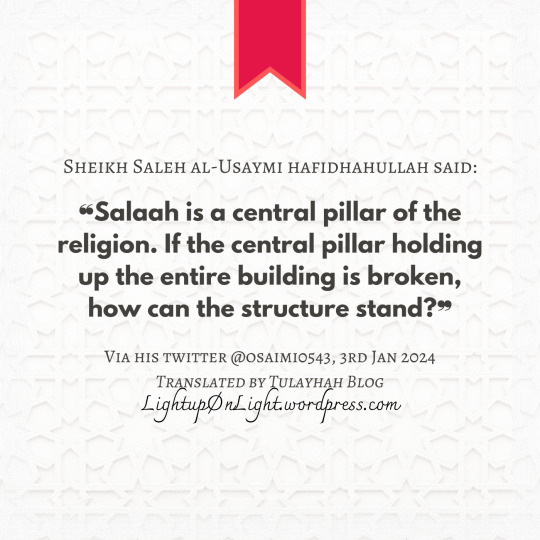
Rasulullah salla Allahu alayhi wa sallam said:
🌺 ❛The angels keep on asking for Allah's Blessing and Forgiveness for anyone of you as long as he is at his Musalla (i.e. praying place), and does not do hadath (i.e. passes wind). The angels say: O Allah! Forgive him, and be Merciful to him.
🌺 Each one of you is in the prayer as long as he is waiting for the prayer, and nothing but the prayer detains him from going [back] to his family.❜ 【Sahih al-Bukhari 659】
An amazing hadith! By just waiting for salaah at our place of prayer, we’re already considered IN the prayer. And on top of that, as long as we remain at our praying place without breaking our wudu, the angels will make supplications to Allah for us. There is so much rahmah and forgiveness from Allah revolving around salaah.
🌿 From the moment we make wudu’:
❛When a Muslim or a believer washes his face [for wudu], every sin he contemplated with his eyes will be washed away from his face along with water or with the last drop of water;
when he washes his hands, every sin committed by the hands will be effaced from his hands with the water or with the last drop of water;
and when he washes his feet, every sin towards which his feet have walked will be washed away with the water or with the last drop of water — with the result that he comes out pure from all sins.❜ 【Sahih Muslim 244】
🌿 To the moment when we walk to the masjid.
❛He who purified himself in his house (i.e. making wudu), and then he walked to one of the houses of Allah for the sake of performing a fard (obligatory act) out of the fara'id (obligatory acts) of Allah, both his steps [would be significant] as one of them would obliterate his sin, and the second one would raise his status.❜ 【Sahih Muslim 666】
🌿 To the moment we sit at our musalla waiting for the adhan, all the way until we perform the actual salaah, and then remaining at the musalla to do dhikr after salaah.
And this is just one fard salaah. Then what about the reward for those who safeguard all of his 5 daily prayers?
There are numerous opportunities Allah gives us every single day. So what a shame, what a missed opportunity, what a huge loss if we delay, or intentionally miss a fard salaah entirely (which is a major sin in and of itself).
May Allah write us as those who consistently safeguard their salaah, and pray at its appointed time with no delay.
Your sister in Deen,
Aida Msr ©
2 notes
·
View notes
Text

When we think "Patient Prophets", which prophets come to mind? We would usually think of Rasulullah salla Allahu 'alayhi wa sallam, Prophet Ayub, Ya'qub, Nuh — peace be upon them all. But Prophet Musa 'alayhis-salaam rarely crosses our mind. Ibn Mas'ud radi Allahu 'anhu narrated:
🌺 ❛Once Rasulullah divided and distributed [gains from war]. An Ansar man said: ‘By Allah! Muhammad, by this distribution, did not intend to please Allah.’ So I came to Rasulullah and informed him about it, whereupon his face changed with anger and he said: 'May Allah bestow His Mercy on Musa, for he was hurt with more than this, yet he remained patient.'❜ 【Sahih al-Bukhari 6059】
We face different types of tests — natural disasters, a failing health, the loss of a loved one — but Prophet Musa was tested in a very particular way. He was tested with his own people. Allah says:
🌺 ❛O you who believe! Be not like those who annoyed Musa…❜ 【Surah al-Ahzab 33:69】
Prophet Musa’s concern and struggles for his people were underappreciated. With the help of Allah, he freed them from Firaun’s slavery, yet we find in the Qur’an that they continued to disobey Allah and Prophet Musa one instance after another. His people would do something that would undermine him, harmed him, questioned him. But Prophet Musa never wronged them. As much as they harmed him, he was patient with them.
Indeed, the most difficult test in one’s life is the one that involves people. Dealing with people can be extremely difficult — especially when you’re trying to help that person out of love, but he instead attributes evil to you, reviles you, or uses you for personal gain. Prophet Musa frequently had to face this type of test to a greater degree, yet he was still patient with them.
But what about when Prophet Musa found out that his people were worshipping the idol in his absence? Didn’t he drop the tablet, and got upset? Is that a trait of a patient man?
The answer is still yes.
Because Prophets got angry when they saw injustice. When the boundaries of Allah were crossed, the Prophets would get very angry. But their characters didn’t turn foul in any way shape or form. They had righteous anger, and we too should have righteous anger. Dhulm should make us angry. But how we deal with that anger determines whether it's righteous or not.
So patience is not always silence. Patience is not always about speaking in a soft voice and not be angry. But patience is, even when we deal with our anger, is well measured in accordance to that which is pleasing to Allah subhanahu wa ta'ala, that we do not react or behave with something that does not befit the character of a mu'min.
May Allah grant us wisdom when dealing with our anger, and beautify us with righteous character.
Your sister in Deen,
Aida Msr ©
2 notes
·
View notes
Text

A beautiful gem from Sheikh as-Sa'di rahimahullah. May Allah make us amongst those who always return to Him in sincere repentance.
Your sister in Deen,
Aida Msr ©
7 notes
·
View notes
Text

There is a beautiful yet poignant hadith — about the death of Ibrahim, the son of Rasulullah salla Allah alayhi wa sallam. Anas ibn Malik radi Allahu anhu narrated:
❛We entered the house of Abu Sayf along with Rasulullah ﷺ, who was the husband of Ibrahim’s wet-nurse.
Rasulullah ﷺ took Ibrahim and kissed him, and smelled him, and later we entered Abu Saif’s house, and at that time Ibrahim was in his last breath.
And the eyes of Rasulullah ﷺ started shedding tears.
Abdur Rahman bin Auf said, “O Rasulullah, even you are weeping?”
He ﷺ said, “O Ibn Auf, this (crying) is rahmah.”
Then he ﷺ wept more and said,
“The eyes are shedding tears, and the heart is grieved,
and we will not say, except what pleases our Rabb.
O Ibrahim, indeed we are grieved by your separation.❜【Sahih al-Bukhari 1303】
I remember reading this hadith while in a state of grief for losing our beloved cat. As I read, I wondered at the intensity of Rasulullah's grief for losing his beloved son. There was a touching quote that goes: ❛Grief is just love with nowhere to go. It gathers in your throat, and falls from your eyes.❜
People cry, and our Deen says it’s okay. It’s okay for us to cry. Rasulullah ﷺ said that crying is rahmah, and our beautiful Deen doesn’t teach us to go against our fitrah.
But what is prohibited is saying what is displeasing to Allah, questioning His Qadr and Wisdom, wailing and beating ourselves. Rasulullah ﷺ said:
🌺 ❛”Do you not hear? Allah does not punish for shedding tears, nor for the grief of the heart, but He punishes or bestows His Mercy because of this” [then] he pointed to his tongue and added: “The deceased is punished for the wailing of his relatives over him.”❜ 【Sahih al-Bukhari 1304】
The bitter fact of this dunya is that we will eventually lose someone we love. But our love towards others should never supersede our love for Allah. These wins and losses are reminders that everything we have and lost in this dunya are just temporary. The One Who is eternally everlasting is Allah subhanahu wa ta'ala, and it is He alone Who has the absolute power to reunite us in a place where there will never be separations anymore.
And so we ask Allah to not test us beyond our capacity. May the trials in this dunya strengthen our relationship, love and dependency on Allah subhanahu wa ta'ala.
Your sister in Deen,
Aida Msr ©
2 notes
·
View notes
Text
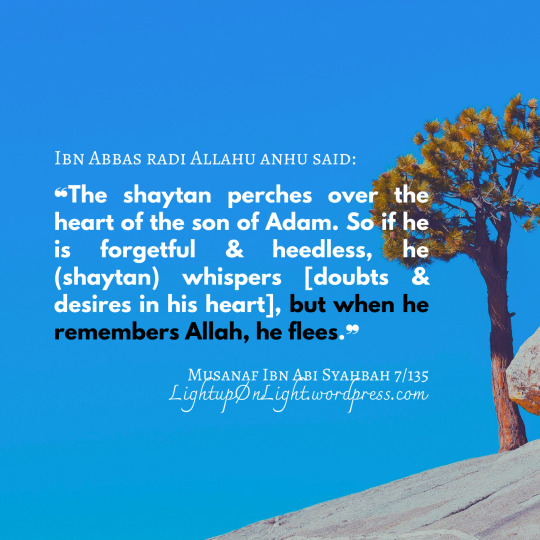
Would you like…?
🌺 Would you like to attain Allah's Protection?
"Whoever prays the morning (Fajr) prayer, then he is under the protection of Allah 'azza wa jall." [Ibn Majah 3946]
🌺 Would you like to be close to Allah?
"A slave becomes nearest to his Rabb when he is in prostration (in salah). So increase supplications while prostrating." [Muslim 482]
🌺 Would you like to be distanced from the Hellfire?
"Whoever fasted a day for the sake of Allah, then Allah distances between him & the Hellfire by 70 years." [Al-Bukhari 2840]
🌺 Would you like to attain the rida of Allah?
"Allah is pleased with His servant who says 'Alhamdulillah' while taking a morsel of food & while drinking." [Muslim 2734]
🌺 Would you like that your scales be heavy with good deeds?
"There are 2 expressions which are very easy for the tongue to say, but very heavy in the scale & are very dear to Ar-Rahman. They are:
{Subhana Allahil-'azim and Subhana Allah wa bihamdihi}. [Al-Bukhari 6406]
Translated by Abbas Abu Yahya
Source: Would you like. . . . ? - Following the Sunnah
8 notes
·
View notes
Text

🌺 Allah says: ❛And when Ibrahim and Ismail were raising the foundations of the House (the Ka’bah) [saying]: Our Rabb! Accept [this service] from us. Verily, You are the All-Hearer, the All-Knower.❜ [Surah al-Baqarah 2 : 127]
When we give charity to build masaajid, it is done with the hope that we too will receive a share of the reward. So imagine the reward of someone putting back the foundation of the Ka’bah with their own hands — as done by Prophet Ibrahim and Prophet Ismail ‘alayhumas-salaam.
The building of the Ka’bah was no small deed. Yet Prophet Ibrahim, whom Allah called Khalilullah (a close friend of Allah), remained humble and unsure whether what he did was good enough. So he made du’a for Allah to accept it from him and his son, Ismail.
From this we learn the important lesson of being humble with our good deeds and good character. If we’re not constantly seeking Allah’s acceptance of the good we did because we assume that our deeds are automatically accepted, then what will slowly seep into our hearts is self-righteousness. We'll begin to feel that we’re better than those others, or we'll start to think that we’re saved from weakness of imaan — and this is a dangerous attitude to have. Allah says:
🌺 ❛So ascribe not purity to yourselves. He knows best who has taqwa.❜ [Surah an-Najm 53 : 32]
What we should have is a healthy balance of fear and hope that our good deeds will be accepted by Allah. This is what the du’a teaches us. Be humble in front of Allah, the One who gives us the capacity to do good in the first place.
Your sister in Deen,
Aida Msr ©
3 notes
·
View notes
Text

Do you know that it is sunnah to recite Aayatul-Kursi after each fard (obligatory) salaah? Rasulullah salla Allahu alayhi wa sallam said:
🌺 ❛Whoever recites Aayatul-Kursi after every prescribed prayer, there will be nothing standing between him and his entering Jannah except death.❜ 【Al-Mu’jam al-Kabir 7406 | Graded Sahih by Sh. al-Albani rahimahullah】
But my teacher taught us something profound. After mentioning the above hadith, he then asked: So is our entrance to Jannah assured simply by us reciting Aayatul-Kursi after the obligatory prayers?
The answer is no, because there are important points in Aayatul-Kursi that we need to fulfil first. Notice that the Aayatul-Kursi begins with:
🌺 ❛Allah! Laa ilaaha illa Huwa (none has the right to be worshipped but He).❜
The very first thing Allah mentions in Aayatul-Kursi is Tawheed. Our aqeedah must be correct, and our ibaadat must be free from any form of shirk. And the smaller form of shirk is to show off, to have riya' in our acts of worship.
Check our purpose when we want to publicize our good deed — what's the hidden intention behind it? Why do we want to make it known to others, when it is sufficient for Allah Ash-Shakoor alone to know?
Look also at our daily interactions, activities, hobbies, and then leave whatever that can taint our imaan even if it seems trivial. For example, those horoscopes games / apps that people excuse as ‘just for fun’ — why do we risk the price of our Jannah?
May Allah make us people of Tawheed, the people of Jannah.
Your sister in Deen,
Aida Msr ©
More gems of Aayatul-Kursi can be read on my website, in shaa Allah: https://lightup0nlight.wordpress.com/2019/06/12/revive-a-sunnah-recite-ayatul-kursi-after-each-fardh-prayer/
6 notes
·
View notes
Text

The word Deen (religion) has the same root as Dayn (debt).
So Deen literally means we have a debt to Allah.
And the only way to repay this debt is to follow His Deen (i.e. adhere to what that has been commanded, and leave off what has been prohibited).
Your sister in Deen,
Aida Msr ©
6 notes
·
View notes
Text

In Sahih al-Bukhari 79, Rasulullah salla Allahu alayhi wa sallam said that the hidaayah and knowledge Allah sent down to him are like these abundant of rain that are crucial for earth. Then he ﷺ said that there are different types of earth (i.e. mankind) that respond differently to that rain. These people are grouped into three categories:
🌺 (1) ❛…some of which was fertile soil that absorbed rain water, and brought forth vegetation and grass in abundance….❜
The first type of mankind is like fertile soil. They welcome the rain, absorb it, and then from it, grows vegetations that benefit everyone. This group welcomes the teachings of Rasulullah ﷺ. They are earnest in their effort to study the Deen, keen to practice what they have learned, and then they make efforts to teach and spread what they know so that others may benefit from it as well.
They are ‘aalim (knowledgeable), ‘aamil (practice what they’ve learned), mu’allim (teach what they know). This is the BEST group.
🌺 (2) ❛…another portion of it was hard and held the rain water, and Allah benefited the people with it, and they utilized it for drinking, making their animals drink from it, and for irrigation of the land for cultivation…❜
The second group is like hard soil, grooved, able to hold and contain the rainwater so that it benefits others, but the soil itself is unable to absorb the water (imagine a hard soil with puddles).
At first glance, they sounded like an OK group. But they’re not. Sure, this group studies the teachings of Rasulullah ﷺ and disseminate the knowledge, but they themselves do not believe nor practice it. Think of the orientalists who studied Islam, wrote books about it, but they themselves do not believe in the religion.
🌺 (3) ❛… a portion of it was barren, which could neither hold the water nor bring forth vegetation.❜
The last group is like a hard, barren soil, that not only is incapable to absorb water, it also cannot hold water for others to benefit from it. These are people who reject the teachings of Rasulullah ﷺ, earning no benefit for himself and others. And how many among the Muslims who reject sound ahadith, and stop others from learning the correct teaching of this Deen?
May Allah make us from the first group.
Your sister in Deen,
Aida Msr ©
3 notes
·
View notes
Text

🌺 Allah subhanahu wa ta’ala says: ❛…If you are grateful, I will increase you…❜ 【Surah Ibrahim 14:7】
Notice that Allah does not specify or limit the capacity of what the increase will be. He does not say if we’re grateful, then He will increase us in imaan, or wealth, or health. Allah left it unlimited, and one of the reasons is perhaps because the potential of being a truly grateful ‘abd is almost unlimited. The greatest example of all is Rasulullah salla Allahu ‘alayhi wa sallam, who used to pray so much that his feet would become swollen. When asked as to why he prayed so much, he ﷺ said:
🌺 ❛Shall I not be a thankful servant?❜ 【Sahih al-Bukhari 6471】
Rasulullah ﷺ could stand up and pray at night, after night, after night, standing longer than anybody else because he ﷺ was truly grateful to Allah. When was the last time we contemplated our blessings and thanked Allah?
We want so many things, but complain when receiving a blessing that “doesn’t live up to my expectation”.
My life is so dull and boring.
My friend has a better lifestyle than me.
Why am I not popular enough?
Among the oft-forgotten act of worship is remembering the favours of Allah. And there are so many things to be thankful for: Our imaan, our family, our halaal job, the food in our fridge, the car that runs well, the roof over our heads, the capacity to do khayr, and so much more. Because if we don’t do that, then we will feel miserable, always unhappy, always complaining, always depleted, always going to be bitter — even if Allah gives us everything.
May Allah help us to remember Him, to be grateful to Him, and to be content with what He has given us. We ask Al-Wahhab to put barakah in the blessings that we have, and grant us what is good for our Deen, dunya, and akhirah.
Your sister in Deen,
Aida Msr ©
5 notes
·
View notes
Text
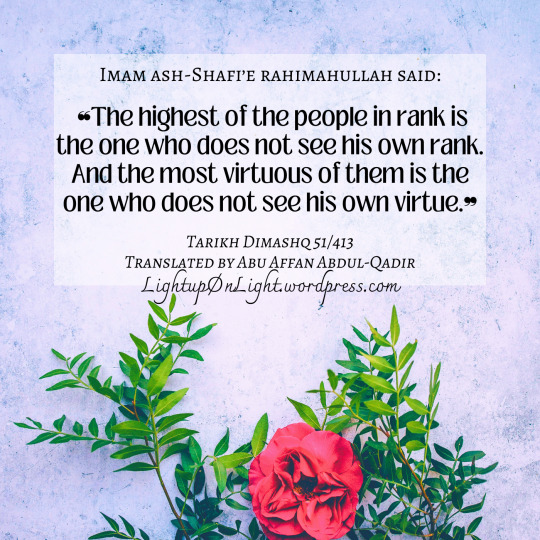
How would we define success?
For many of us, success is equivalent to acquiring immense wealth, properties, possessions, popularity and high standing with the people.
But take a moment to ponder on this hadith.
One day, a man passed by Rasulullah salla Allahu ‘alayhi wa sallam, and he ﷺ asked a person who was sitting beside him: ❛What is your opinion about this [passerby]?❜
The man replied: ❛This [passerby] is from the noble class of people. By Allah, if he should ask for a lady's hand in marriage, he ought to be given her in marriage; and if he intercedes for somebody, his intercession will be accepted.❜
Rasulullah ﷺ remained silent, until another man passed by. He ﷺ asked the same question again: ❛What is your opinion about this [second] one?❜
The man replied: ❛O Rasulullah, this person is one of the poor Muslims. If he asks for a lady's hand in marriage, no one will accept him; and if he intercedes for somebody, no one will accept his intercession; and if he talks, no one will listen to him.❜
🌺 But this time, Rasulullah ﷺ corrected him by saying: ❛This [poor Muslim man] is better [in the Sight of Allah] than the earth filled with the first man.❜ 【Sahih al-Bukhari 6447】
The hadith teaches us a very important matter: Regardless of how we see people, and how we want to be seen by people, the way Allah sees us is what is truly important.
The point of our focus should not be on what people think, rather what matters is who we are in the Sight of our Rabb?
We're missing the point if we think rich is bad, and poverty is good. Richness by itself is not good. Poverty by itself is not good. These are not, and should not be our measurements for success. The only good thing by itself are Imaan and Taqwa.
And alhamdulillah, the beauty of this Deen is that every single one of us has the opportunity to attain success in the akhirah, regardless of whether we’re rich or poor, popular or unknown. Because the real measurement in the Sight of Allah is not our wealth, not our status, not our popularity, but our Imaan and Taqwa.
🌺 ❛Verily, the most honourable of you with Allah is that [believer] who has at-Taqwa.❜ 【Surah al-Hujraat 49:13】
Laylatul-Qadr is hidden amongst men, and its appearance is unknown, yet it is the best of all nights. Similarly, you being unknown is not detrimental, for perhaps you are honourable, worthy and noble in the Sight of Allah.
Your sister in Deen,
Aida Msr ©
3 notes
·
View notes
Text

A lesson we need to be reminded of always is not to judge a book by its cover. I see reasons for this daily.
Kids who don't "look" a part can take you by surprise; they may take the initiative to take on a responsibility you never expected they were up to. Or a person who you know isn't wealthy gives a donation not even many of the wealthy give.
People have "secret" dealings with Allah that we have no idea about, and those private and secret deeds may set them so far above others, we can't imagine it.
— Sheikh Younus Kathrada
___________
Indeed, people will judge us based on our outer appearance, what we do, where we work, how much we earn and how much our net worth is, the people in our social circles, the position we have in our company, and so on, and so forth.
But our Rabb doesn't look at all of these matters. Rather, He subhanahu wa ta'ala looks at our hearts and actions. Rasulullah salla Allahu alayhi wa sallam said:
🌺 ❛Verily Allah does not look to your faces and your wealth, but He looks to your heart and to your deeds.❜ 【Sahih Muslim 2564c】
So regardless what people may think about you, continue with your khayr and secret dealings with Allah. You may not surpass the people in this dunya, but perhaps Allah will allow you to surpass them in the akhirah beyond everyone's imagination.
Your sister in Deen,
Aida Msr ©
1 note
·
View note
Text
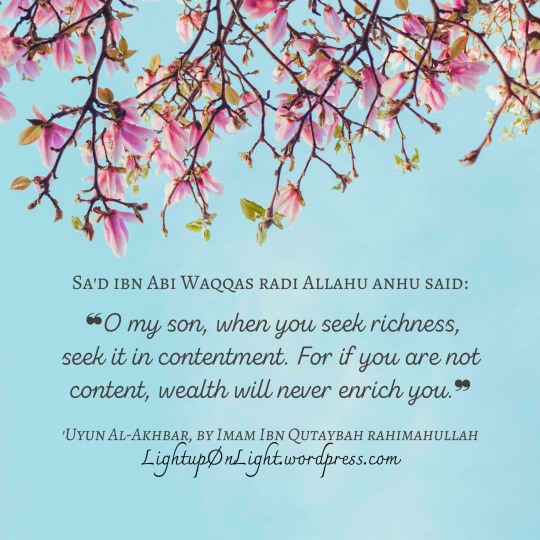
Do you know how to achieve happiness in this dunya?
By attaining qana’ah (contentment). By being pleased with what Allah subhanahu wa ta'ala has given us.
Without qana’ah, even the wealthiest person would feel unsatisfied, envious, and depressed when they see others have a little bit more than him.
🌿 Ibrahim ibn Shayban rahimahullah said: ❛Freedom is in contentment.❜ 【Madarij as-Salikeen 2/314】
When we're content, we are freed from the shackles of materialism.
And when we're content, Allah puts barakah in what we have. Rasulullah salla Allahu alayhi wa sallam said:
🌺 ❛Allah tests His servant by giving to him. Whoever is content with what Allah has apportioned for him, Allah will bless (i.e. grant barakah to) him in it and expand it. Whoever is not content, he will not be blessed in it.❜ 【Musnad Ahmad 20279 | Graded Sahih by Sh. al-Albani rahimahullah】
The more we are content and grateful to Allah, the more He will give.
May Allah grant us happiness in this dunya and eternal bliss in the akhirah.
Your sister in Deen,
Aida Msr ©
5 notes
·
View notes
Text

❛Allah said: "The sight [of Rasulullah salla Allahu alayhi wa sallam] turned not aside [right or left], nor it transgressed beyond the limit [ordained for it]." 【Q53:17】
And this is a manner from the mannerisms of visiting.
A guest should not look around the house of his host excessively, much less ask excessively about that which does not concern him.
Do not ask about that which does not concern you, and this is from the perfection of your Islam.❜
— Sheikh Dr. Muhammad ibn Ghalib Al-'Umari hafidhahullah
____________________
May Allah bless the sheikh for saying this!
When we're invited to someone's house, show courtesy to the host by not wandering around to other rooms and areas, looking around his or her house excessively.
Don't be a toxic guest by asking sensitive questions, giving backhanded compliments, or trying to pry into the private lives of others. Rasulullah ﷺ said:
🌺 ❛Verily, among excellence in Islam is for a person to leave what does not concern him.❜ [Sunan at-Tirmidhi 2318 | Graded sahih by Sh. al-Albani rahimahullah]
From this hadith, we learn that from the perfection of our Islam is to mind our own business.
Whoever wants for his Islam to be beautiful, for his imaan to increase, for his religion to be perfect, then let him leave matters that are not of his business. Instead of being a busybody, thank the host, make du'a for ‘aafiyah (well-being) for everyone, and leave that which does not concern us.
Let us all step up as better Muslims.
Your sister in Deen,
Aida Msr ©
If you would like to read a little bit more about this topic, please consider reading this article I wrote exclusively for QalbyApp: From the perfection of our Islam is to mind our own business
5 notes
·
View notes
Text
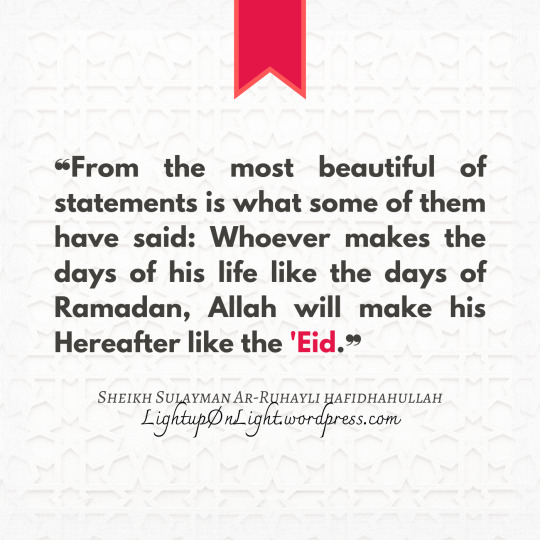
Sheikh Tariq Appleby once wrote that all good things come to an end, except Jannah. And the pursuit of Jannah doesn't end in Ramadan.
So continue with our good deeds. It doesn't mean we have to pray long hours of Qiyamul-Layl every night, but let’s maintain a level of consistency that's personally doable throughout the year — even if we think they're little. One of my favourite ahadith is where Rasulullah salla Allahu ‘alayhi wa sallam said:
🌺 ❛The most beloved deed to Allah is the most regular and constant, even if it were little.❜ 【Sahih al-Bukhari 6464】
A 2 raka'aat of Qiyamul-Layl just before Fajr, 2 pages of Qur’an every day, or just 1 raka’ah of Witr is indeed better than nothing at all. Our Rabb is Ash-Shakoor. A consistent good deed can be THE most beloved deed to Him, no matter how tiny and insignificant we think it is. And Imam Ibn Rajab al-Hanbali rahimahullah said:
🌺 ❛The sign of a good deed being accepted lies in your ability to follow it up with another good deed.❜ 【Lata'if al-Ma'arif v1 p64】
We ask Allah to grant us steadfastness in imaan, taqwa, and khayr until the Day we meet Him, and accept from all of us.
Eid Mubarak!
Your sister in Deen,
Aida Msr ©
1 note
·
View note
Text
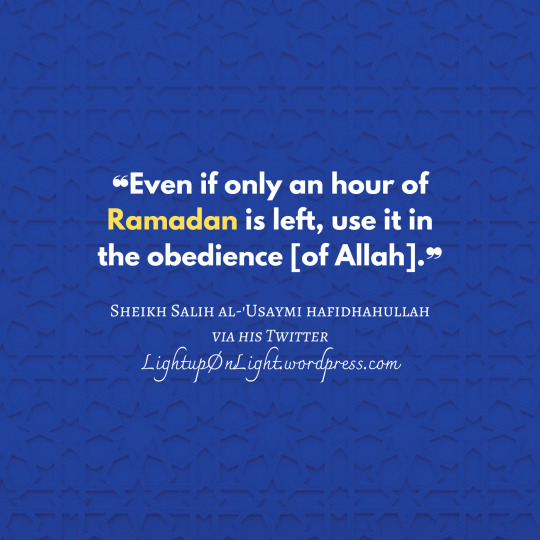
Nearing the end of Ramadan, one should seal it with khayr by seeking Allah’s Forgiveness. Use the last hour of Ramadan with Qur’an, dhikr, supplications, and most importantly, seeking Allah’s forgiveness.
The last hour of Ramadan is after Asr and before Maghrib, where most people would have moved on from Ramadan and shifted into ‘Eid mode. This is a time when most people neglect, and according to scholars, the reward of ‘ibaadat during neglected times is magnified. So make the most of the last hour of Ramadan, and make it an excellent farewell.
🌺 Imam Ibn al-Jawzi rahimahullah said: ❛…Deeds are judged by their conclusions. So if you didn't do well with welcoming Ramadan then perhaps you will do better bidding it farewell.❜
Your sister in Deen,
Aida Msr ©
#wise sayings#salafiyyah#islamic reminders#islamic advice#ramadan reminders#ramadan 2024#ramadan 1445
3 notes
·
View notes
Text
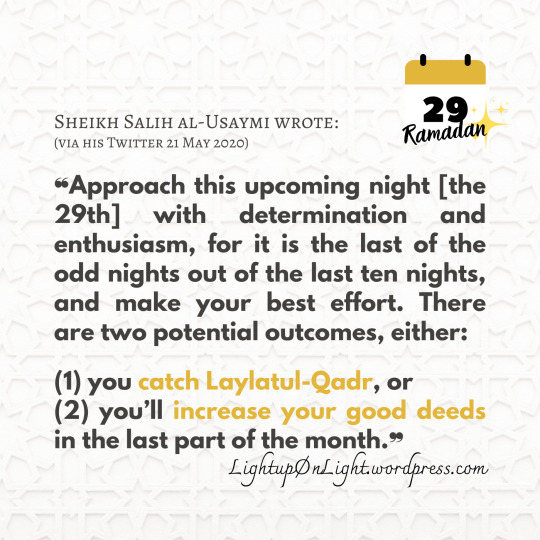
My brothers and sisters in Islam, I know that we’re all tired. We’re all exhausted in the last ten nights. Our routine is out of schedule [especially] those who have work, who have children.
We’re all tired — but alhamdulillah, this is good! Because the tiredness you're experiencing, all of it, is for Allah ‘azza wa jalla. Not for your boss. Not for your family.
🌺 ❛And those who spend the night for their Rabb, prostrating and standing.❜ 【Surah al-Furqan 25:64】
Allah says that the [‘ibadur-Rahman] spend the night for their Rabb — live by this aayah! And perhaps Laylatul-Qadr is still ahead of us, Allahu a’lam. So don’t cut out your worship altogether. This is the time when maximum effort is required. Continue. Keep going. Take time in your sujood.
We’re all weak. We’re all broken. All our deeds have a lot of faults and flaws in them. But our Rabb is Ash-Shakoor. He accepts these small efforts that have so many shortcomings, yet He multiplies them, and grants us a huge reward.
We ask Allah subhanahu wa ta'ala to grant us the strength and ability to perfect the ending of this month, and accept from us.
— Sheikh Abu Bakr Zoud
【Extracted & abbreviated from his video: We Are All Tired & Exhausted, Why Should We Continue To Worship?】
1 note
·
View note